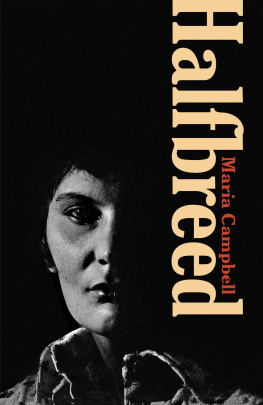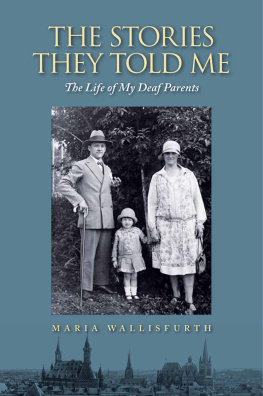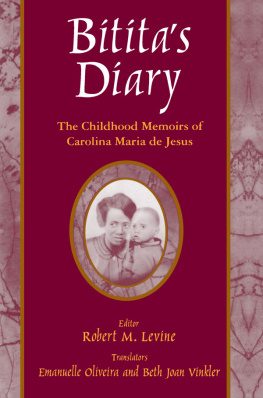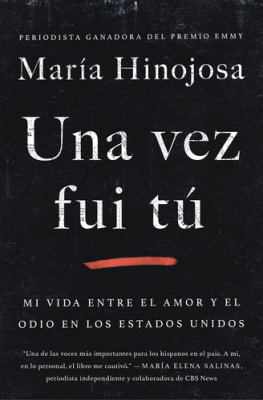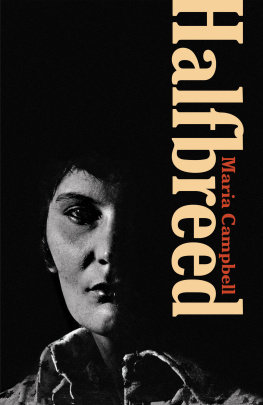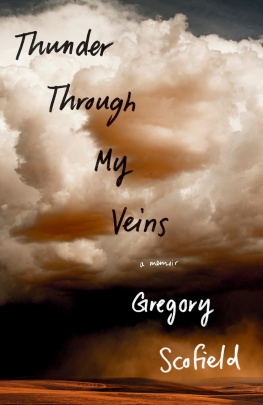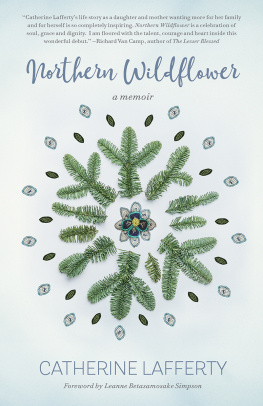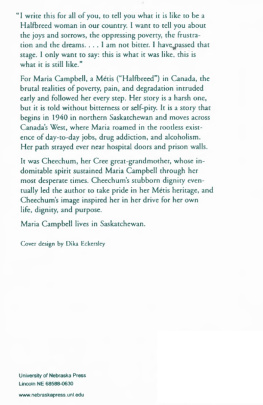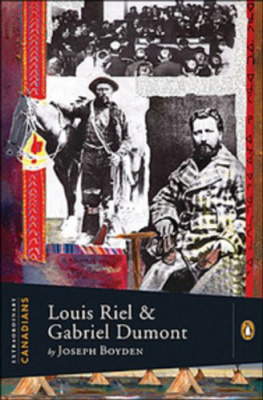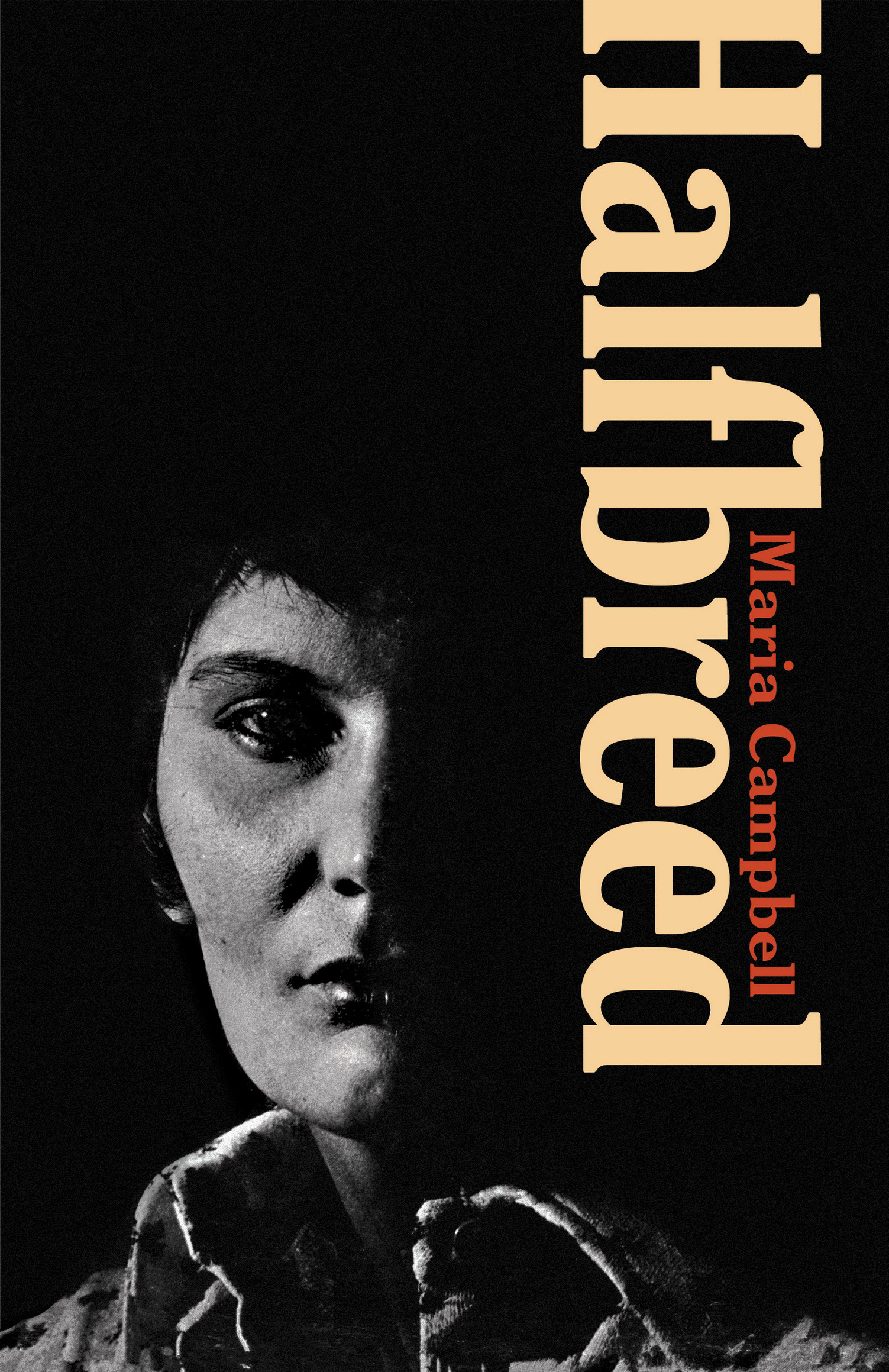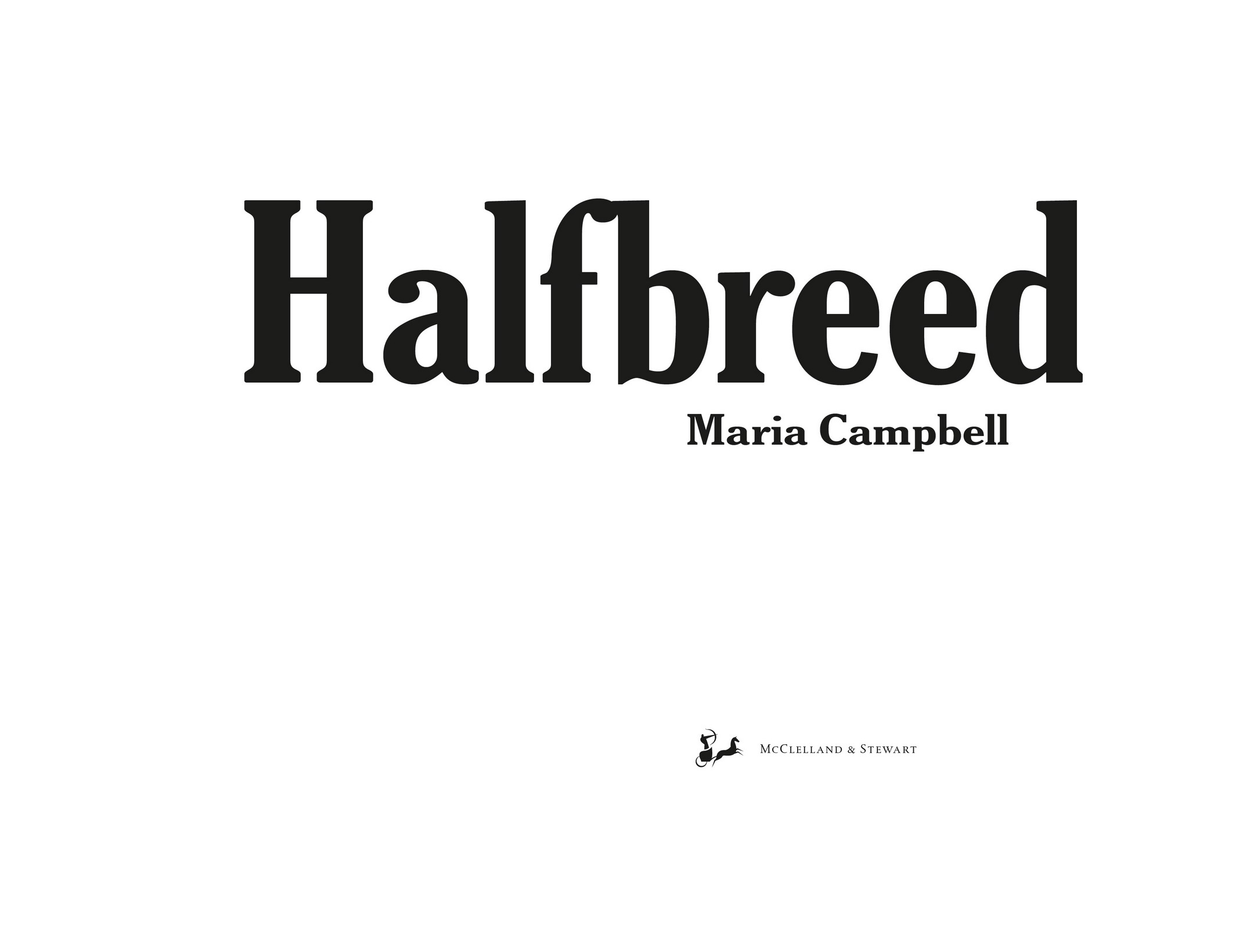Contents
Landmarks
Print Page List
Copyright 1973 by Maria Campbell; Afterword 2019 by Maria Campbell
The Grandmother Place 2019 by Kim Anderson
First hardcover edition published in 1973 by McClelland & Stewart
This paperback edition published in 2019
McClelland & Stewart and colophon are registered trademarks of Penguin Random House Canada Limited.
All rights reserved. The use of any part of this publication reproduced, transmitted in any form or by any means, electronic, mechanical, photocopying, recording, or otherwise, or stored in a retrieval system, without the prior written consent of the publisheror, in case of photocopying or other reprographic copying, a licence from the Canadian Copyright Licensing Agencyis an infringement of the copyright law.
Library and Archives Canada Cataloguing in Publication data is available upon request
ISBN:9780771024092
Ebook ISBN:9780771024108
Front cover photograph: Dan Gordon
McClelland & Stewart,
a division of Penguin Random House Canada Limited,
a Penguin Random House Company
www.penguinrandomhouse.ca
v5.3.2
a
Contents
This book is dedicated to my Cheechums children. Thank you Stan Daniels for making me angry enough to write it; Peggy Robbins, for your understanding and encouragement but especially for believing I could do it; my family, for your patience; Elaine, Kay, Sheila, Sarah and Jean, for understanding, listening, typing and babysitting; and a special thank you to my friend Dianne Woodman.
The Grandmother Place
AN INTRODUCTION BY KIM ANDERSON , PH . D .
Its midsummer, 2017 and a group of women are sitting around the open kitchen/living area at the Crossing, Maria Campbells home on the South Saskatchewan River. For many of us this is Metis homeland, a space Maria created on the land where Gabriel Dumont and his wife, Madeleine, once operated Gabriels Crossing. In Dumonts time, a ferry transported Red River carts across the South Saskatchewan as they made their way to Batoche and other nearby Metis communities. Marias great-grandmother Cheechum spent time here when she was a child, and later, when Maria was a girl, it was a stopping place where her family would camp, visit with the owners overnight, or spend a few days by the river while Marias dad and uncles threw fishing nets. Maria purchased the property in 1975a few years after Halfbreed was publishedand since that time it has been a place where Indigenous leaders, storytellers, musicians, artists, activists, and scholars have crisscrossed, coming and going to replenish and engage as they make their marks on the world.
You can still see the tracks of the Red River carts on the hills as they snake down toward the river, familiar signs for those of us who have spent days sitting on the bank of the other side. This is where Maria sends people out to fast, and today we feel the power of those timeless tracks as we have just completed our week-long fasting camp. We are exhilarated and exhausted from all the labour involved in holding ceremony and are ready to settle into the storytelling that follows. Maria is finally sitting down at the kitchen table next to the big brown teapot that never goes empty. Mugs are scattered about but the rest of the dishes are drying in a basin on top of the wood stove, pots have been hung back up in their proper places on the walls, and the fasters and helpers sit at the table or sprawl out on the couches under the fine art in the adjoining living room. Most of us are middle-aged Metis and First Nations women, and in our lives outside the Crossing we work in community organizing, academia, law, medicine, midwifery, land-based learning, and the arts. We are part of Marias extensive lodge family, the ones who work, train, and do ceremony with her. She has mentored every one of us, and as she nears her eightieth year, she is telling us she wishes to transfer some of the responsibilities she has been carrying. We look around and realize that even though there are eight of us present and as many or more across the country, we will be challenged to take it on because of the current range and depth of her work.
This is the grandmother place Maria occupies as she launches the revised version of Halfbreed, more than forty-five years after it was first published. If the reader wonders what happened to the passionate young woman who wrote Halfbreed, it should come as no surprise that Maria continues to be a person of hard, steady work fuelled by a love for her people and a commitment to justice. She is a leader who works with an expansive range of people, always in the spirit of wahkotowin, an interconnected web of relations in which everyone has responsibilitiesfor as she has often said, you never get anywhere unless you take your people with you. These community responsibilities are intricately woven with Marias work as a powerful translator of art and spirit, and the foundation for all of this can be found in the narrative she shares about her young life in Halfbreed. The book contains so many teachings it is possible to gain something new with each reading, but when I read it this time my first thoughts were about the connections between the Maria in the book and the one many of us know today.
First, Halfbreed is full of stories of a grounded childhood community, stories that translate to the teachings about kinship, land, and storytelling Maria now shares as an esteemed Elder and Metis knowledge carrier. Halfbreed shows us a young woman with a deep commitment to family as she works against formidable challenges to be a caregiver/protector to her siblings and her own infant children. The fruits of this can be seen today, as Maria is now a great-grandmother supporting a large kinship network that includes her own five children, their children and grandchildren, the siblings, the nieces and nephews, and then the many others who have come into Marias lodge family. The Maria we meet in Halfbreed is also inquisitive, a critical thinker who questions the power of the local priest and the patriarchy of her own political leaders. Toward the end of the book, Maria takes a critical approach to research, and all of this signals how Maria will go on to a long career in research, mentoring, and teaching in academic and community settings. Halfbreed is a book about historic injustices toward Metis people, and the ongoing nature of these injustices make it necessary for Maria to keep working for Indigenous peoples and lands. Finally, the power and craft of the storytelling in Halfbreed foreshadow what will become a trail-blazing career in the arts.
Maria, then, is a remarkable person, and Halfbreed is a remarkable book that went on to live its own full life as one of the most influential works of Indigenous literature. We now live in an era of truth and reconciliation, but before Halfbreed, there were very few resources that revealed the truth of racism and oppression against Indigenous peoples in Canada. Marias skill in telling the story from her lived experience changed the lives of many Indigenous peoples across North America, as they had rarely seen an accurate portrayal of their lives in print.

